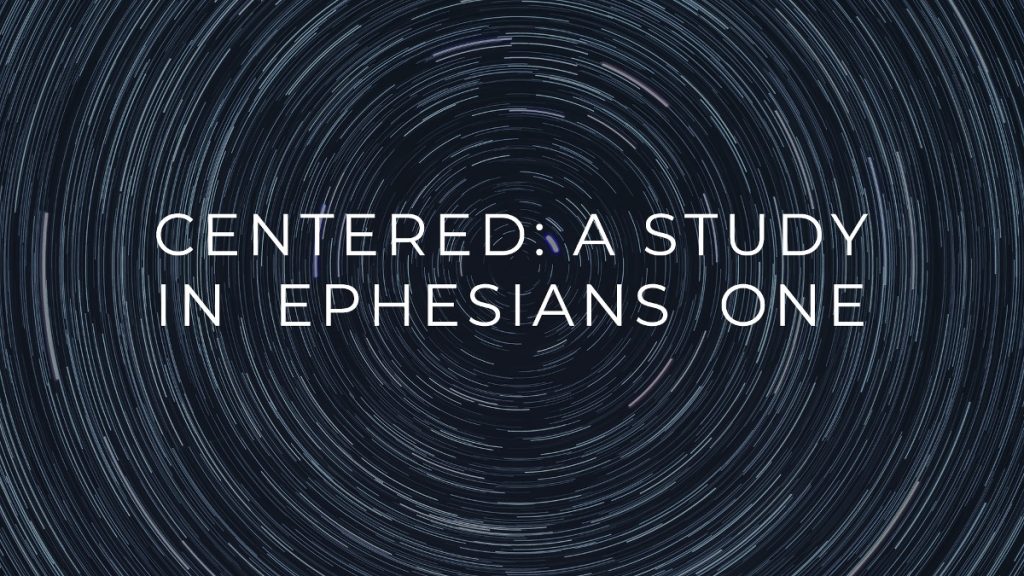Passage: Ephesians 1:3-14
Guide for Group Discussion or Personal Reflection
Sermon Summary
In order to endure this lengthy hardship, we need a concrete purpose and aim in life—an aim so great that even suffering cannot take it away. Thankfully, we are not left to find our own purpose on this earth, and in Ephesians 1:3-14, Paul expounds upon the great aim of all of God’s works—indeed the great aim of the whole universe: the praise of his glory.
The word glory, which means “weight” in Hebrew, describes the essence or substance of something. Someone’s “glory”, then, is what they are “full of”—whether riches or honor or noble deeds—and what therefore makes them significant. God’s glory is found supremely in his grace; that is, his unrelenting love for undeserving sinners. Because grace is the “stuff” that God is “made of” all of his works, whether in election or adoption or anything else, are ultimately done for the display and “praise of his glorious grace.”
Understanding that this is what God is “full of” changes our lives on many levels. It gives us a new plan for our lives. Rather than reading the Bible to find out pointers for how to fix ourselves, we come to the Scriptures to learn the story about what our gracious God has done through Jesus to heal the whole world, and then fit our own stories into his. Grasping God’s grace also makes us into a new kind of people—a people marked by self-giving, others-focused love. Finally, God’s grace gives us a new purpose. We can live so that others may see, and understand, and praise God’s glorious grace, no matter how difficult the season!
Sermon Outline
- What is the nature of God’s glory? (1:5-6; 12; 14; assorted scriptures)
- Why does it matter? (1:5; 9-10; 11; 2:1-7; 5:1; assorted scriptures)
Group Discussion & Personal Reflection Guide
Re-read the passage (Ephesians 1:3-14)
What is the nature of God’s glory? (1:5-6; 12; 14; assorted scriptures)
Q) INTRO: Pastor Bobby began by sharing how we all need an aim in life—something definite and solid to live for. What are some common “aims” people have in life? Have you ever experienced a season in your life when you felt like you lacked an “aim” or a purpose? What was that season like?
Q) Re-read verses 5-6, 11-12, and 13-14, one at a time. What does Paul repeatedly say is the aim of all of God’s works (e.g. of predestination to adoption, of making us his inheritance, of “sealing” us with the Holy Spirit)?
Q) Paul says that God’s great aim—and thus our great aim—is that everything might be “to the praise of his glory” or “to the praise of his glorious grace.” What image comes to mind when you hear the phrase “God’s glory?” What does the word “glory” mean?
Q) Pastor Bobby said that someone’s glory is what they are “full of”—what makes them significant, or the “essence” of who they are. God is glorious in that he is “full of” grace. How, if at all, does this change the way you view God? Is it your tendency to view God as gracious to the core? What would change about your life this week if you believed that grace was the “stuff God is made of”?
Q) Who is someone in your life who is close to you but not a Christian, who would be encouraged to know that God is full of grace, at his core? Practice how you might explain to them this truth that God is full of grace. In what situation might this conversation arise?
Why does it matter? (1:5; 9-10; 11; 2:1-7; 5:1; assorted scriptures)
Q) Re-read 1:9-10. Pastor Bobby said that understanding the nature of God’s glory gives us a new plan for our lives. Rather than coming to the Bible to learn tips for how to fix ourselves, we now read the whole Bible as the story of God graciously working to heal the whole world through Jesus, and we want to align our own story with God’s greater story. Is this the way you typically read the Bible? Why or why not?
Q) Can you think of a time in your life when you wanted to fit God into your plan for your life, rather than fit yourself into God’s plan for the world? When was it? How was God’s plan better?
Q) Pastor Bobby said that understanding God’s glorious grace forms us into a new kind of people—a people marked by self-giving, others-centered love. Is there a situation you’ll be facing this week (e.g. maybe at work, or in your family) where you need to live as this “new kind of person”? How might that look?
Q) Understanding God’s glorious grace gives us a new purpose. What might it look like to live for the praise of his glorious grace in your work? In your education? In your family?
Additional Application Questions
Q) How else would you like to engage with God this week?
Q) How can you tangibly care for those in your community this week, both inside and outside of the church?
Prayer
Spend time praying for yourselves, our church community, the North Shore community, and our nation and world—particularly those most vulnerable.

